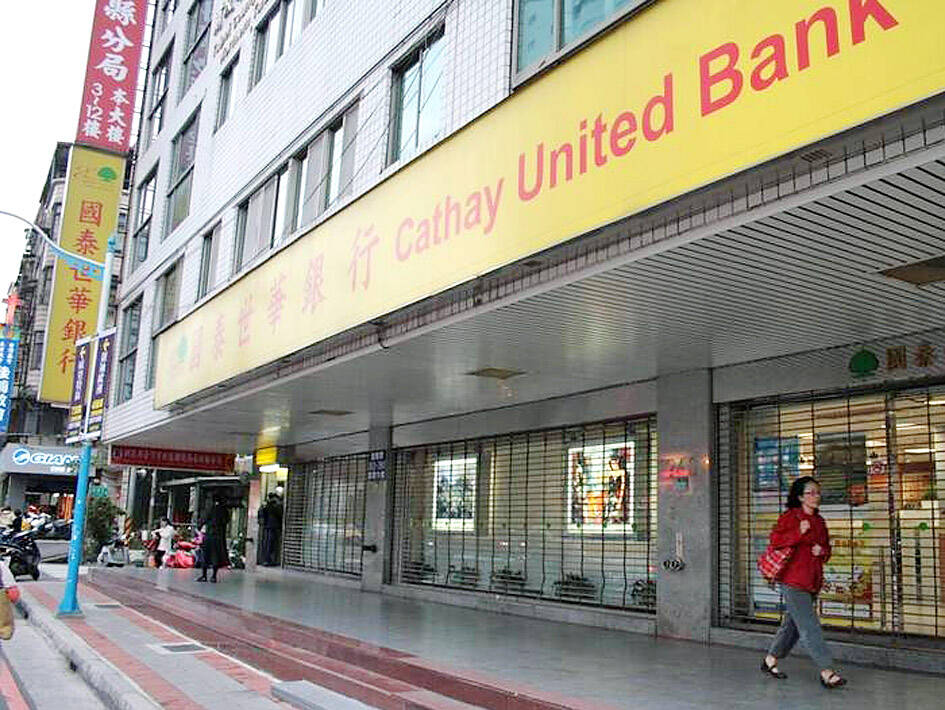Cathay Financial Holding Co (國泰金控), Taiwan’s largest financial firm by assets, is hiring more staff in Singapore to follow shifting regional money flows as its clients expand their presence in Southeast Asia.
The group’s Cathay United Bank Co (國泰世華銀行) is ramping up headcount in the city-state to about 200 by next year, from 100 two years ago, said Winfield Wong (黃偉坤), chief executive officer of the bank’s Singapore unit.
Recent additions include relationship managers for corporate clients that are expanding in the region, as well as private bankers, he said.

Photo: Taipei Times file photo
The growth plan underscores how Singapore and its neighbors are benefiting as US-China tensions prompt companies to diversify investments and manufacturing throughout Southeast Asia.
“There’s huge outbound investment flows as a result of supply-chain diversification,” Wong said in an interview.
Taiwan’s Vanguard International Semiconductor Corp (世界先進) and NXP Semiconductors NV are teaming up to build a US$7.8 billion semiconductor fab in Singapore, the companies announced early this month.
Hon Hai Precision Industry Co (鴻海精密), a major supplier to Apple Inc, is among firms adding plants in Vietnam.
This year, the Taiwanese bank is looking to add more staff in information technology, risk, transaction management and capital solutions, Wong said.
Cathay United Bank operates in nine Southeast Asian markets. The lender’s private-bank assets under management in Singapore doubled to several hundred million dollars since the business started there in 2020, Wong said.
The minimum threshold for an account is about US$2 million.
Wong is among the recent hires. The Singaporean joined Cathay in February last year, after more than 12 years at HSBC Holdings PLC, where he rotated around Hong Kong, Vietnam and the city-state. He has also worked at Citigroup Inc and ANZ Group Holdings Ltd.
China was once the top destination for Taiwanese investors and accounted for 84 percent of Taiwan’s foreign direct investment at its peak in 2010. That dropped last year to 11 percent, and lagged behind a group including India, Australia and Southeast Asia for the second year in a row.
The Taiwanese banking sector’s total exposure to China has contracted for 12 consecutive quarters and reached its lowest level in the first three months this year, data from the Financial Supervisory Commission showed.

Taiwanese suppliers to Taiwan Semiconductor Manufacturing Co. (TSMC, 台積電) are expected to follow the contract chipmaker’s step to invest in the US, but their relocation may be seven to eight years away, Minister of Economic Affairs J.W. Kuo (郭智輝) said yesterday. When asked by opposition Chinese Nationalist Party (KMT) Legislator Niu Hsu-ting (牛煦庭) in the legislature about growing concerns that TSMC’s huge investments in the US will prompt its suppliers to follow suit, Kuo said based on the chipmaker’s current limited production volume, it is unlikely to lead its supply chain to go there for now. “Unless TSMC completes its planned six

Intel Corp has named Tasha Chuang (莊蓓瑜) to lead Intel Taiwan in a bid to reinforce relations between the company and its Taiwanese partners. The appointment of Chuang as general manager for Intel Taiwan takes effect on Thursday, the firm said in a statement yesterday. Chuang is to lead her team in Taiwan to pursue product development and sales growth in an effort to reinforce the company’s ties with its partners and clients, Intel said. Chuang was previously in charge of managing Intel’s ties with leading Taiwanese PC brand Asustek Computer Inc (華碩), which included helping Asustek strengthen its global businesses, the company

Power supply and electronic components maker Delta Electronics Inc (台達電) yesterday said second-quarter revenue is expected to surpass the first quarter, which rose 30 percent year-on-year to NT$118.92 billion (US$3.71 billion). Revenue this quarter is likely to grow, as US clients have front-loaded orders ahead of US President Donald Trump’s planned tariffs on Taiwanese goods, Delta chairman Ping Cheng (鄭平) said at an earnings conference in Taipei, referring to the 90-day pause in tariff implementation Trump announced on April 9. While situations in the third and fourth quarters remain unclear, “We will not halt our long-term deployments and do not plan to

The New Taiwan dollar and Taiwanese stocks surged on signs that trade tensions between the world’s top two economies might start easing and as US tech earnings boosted the outlook of the nation’s semiconductor exports. The NT dollar strengthened as much as 3.8 percent versus the US dollar to 30.815, the biggest intraday gain since January 2011, closing at NT$31.064. The benchmark TAIEX jumped 2.73 percent to outperform the region’s equity gauges. Outlook for global trade improved after China said it is assessing possible trade talks with the US, providing a boost for the nation’s currency and shares. As the NT dollar